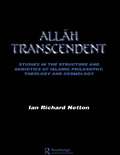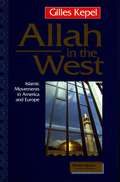- Table View
- List View
All-round Expert In City: Volume 4 (Volume 4 #4)
by Xiao LouTingYuHe was originally an ordinary orphan, but his stealth skill, "God", was activated by a lightning strike. He could hide himself to hug beauties and assassinate his enemies in the dark! Beautiful ladies, status is easy to obtain! He was a tyrannical king who roamed the world with his arms around the city!
All-round Expert In City: Volume 5 (Volume 5 #5)
by Xiao LouTingYuHe was originally an ordinary orphan, but his stealth skill, "God", was activated by a lightning strike. He could hide himself to hug beauties and assassinate his enemies in the dark! Beautiful ladies, status is easy to obtain! He was a tyrannical king who roamed the world with his arms around the city!
All-round Expert In City: Volume 6 (Volume 6 #6)
by Xiao LouTingYuHe was originally an ordinary orphan, but his stealth skill, "God", was activated by a lightning strike. He could hide himself to hug beauties and assassinate his enemies in the dark! Beautiful ladies, status is easy to obtain! He was a tyrannical king who roamed the world with his arms around the city!
All-round Expert In City: Volume 8 (Volume 8 #8)
by Xiao LouTingYuHe was originally an ordinary orphan, but his stealth skill, "God", was activated by a lightning strike. He could hide himself to hug beauties and assassinate his enemies in the dark! Beautiful ladies, status is easy to obtain! He was a tyrannical king who roamed the world with his arms around the city!
All-round Expert In City: Volume 9 (Volume 9 #9)
by Xiao LouTingYuHe was originally an ordinary orphan, but his stealth skill, "God", was activated by a lightning strike. He could hide himself to hug beauties and assassinate his enemies in the dark! Beautiful ladies, status is easy to obtain! He was a tyrannical king who roamed the world with his arms around the city!
All-round Housekeeper: Volume 1 (Volume 1 #1)
by Xi ChuangXianRenLin Hao's life was suddenly changed by the Monopoly System. An omnipotent butler appeared in his world and helped him reach the pinnacle of life.
All-round Housekeeper: Volume 2 (Volume 2 #2)
by Xi ChuangXianRenLin Hao's life was suddenly changed by the Monopoly System. An omnipotent butler appeared in his world and helped him reach the pinnacle of life.
All-round Housekeeper: Volume 3 (Volume 3 #3)
by Xi ChuangXianRenLin Hao's life was suddenly changed by the Monopoly System. An omnipotent butler appeared in his world and helped him reach the pinnacle of life.
All-round Housekeeper: Volume 4 (Volume 4 #4)
by Xi ChuangXianRenLin Hao's life was suddenly changed by the Monopoly System. An omnipotent butler appeared in his world and helped him reach the pinnacle of life.
All-round Housekeeper: Volume 5 (Volume 5 #5)
by Xi ChuangXianRenLin Hao's life was suddenly changed by the Monopoly System. An omnipotent butler appeared in his world and helped him reach the pinnacle of life.
AllSpice: GitHub for Hardware Engineers
by Jeffrey J. BussgangAllSpice, a software-as-a-service company that built a GitHub-like revision control tool for hardware engineers, was in the midst of preparing for rapid scale when the 2022 market downturn left them with big decisions to make. Cofounder and CEO Valentina Ratner had to map out the company’s path to a successful Series A while deciding on how they should dedicate their resources. Early customer discovery experiments showed that engineers had an interest in the product, but Ratner needed to figure out the go-to-market motion they should focus their effort on: a bottoms-up freemium model, a top-down enterprise model, or something in between that relied on targeting engineers directly through inside sales efforts. Leading into her April board meeting, Ratner devised a plan to share with her investors.
Alla Prima: A Contemporary Guide to Traditional Direct Painting
by Al GuryA practical and comprehensive guide to direct painting, particularly as it is expressed though the work of the author's mentor, Arthur DeCosta, the legendary master teacher. The book covers the history of the direct methods in both Europe and America. From there, it covers detailed step-by-step lessons and invaluable discussions on drawing structure, broken and smooth brushwork and colour development. Further lessons on colour mixing, palettes and materials, brush technique, drawing and paint layering, portraiture, still life, figure and landscape painting are provided, all through illustrated steps, analysis and historical information.
Allah Is Not Obliged
by Ahmadou KouroumaALLAH IS NOT OBLIGED TO BE FAIR ABOUT ALL THE THINGS HE DOES HERE ON EARTH.These are the words of the boy soldier Birahima in the final masterpiece by one of Africa's most celebrated writers, Ahmadou Kourouma. When ten-year-old Birahima's mother dies, he leaves his native village in the Ivory Coast, accompanied by the sorcerer and cook Yacouba, to search for his aunt Mahan. Crossing the border into Liberia, they are seized by rebels and forced into military service. Birahima is given a Kalashnikov, minimal rations of food, a small supply of dope and a tiny wage. Fighting in a chaotic civil war alongside many other boys, Birahima sees death, torture, dismemberment and madness but somehow manages to retain his own sanity. Raw and unforgettable, despairing yet filled with laughter, Allah Is Not Obliged reveals the ways in which children's innocence and youth are compromised by war.From the Trade Paperback edition.
Allah Made Us: Sexual Outlaws in an Islamic African City (New Directions in Ethnography #5)
by Rudolf Pell GaudioA rich and engrossing account of 'sexual outlaws' in the Hausa-speaking region of northern Nigeria, where Islamic law requires strict separation of the sexes and different rules of behavior for women and men in virtually every facet of life. The first ethnographic study of sexual minorities in Africa, and one of very few works on sexual minorities in the Islamic world Engagingly written, combining innovative, ethnographic narrative with analyses of sociolinguistic transcripts, historical texts, and popular media, including video, film, newspapers, and song-poetry Analyzes the social experiences and expressive culture of ‘yan daudu (feminine men in Nigerian Hausaland) in relation to local, national, and global debates over gender and sexuality at the turn of the twenty-first century Winner of the 2009 Ruth Benedict Prize in the category of "Outstanding Monograph"
Allah Transcendent: Studies in the Structure and Semiotics of Islamic Philosophy, Theology and Cosmology
by Ian Richard NettonExamines the role of God in medieval Islamic philosophy and theology in a new and exciting way. Renouncing the traditional chronological method of considering Islamic philosophy, Netton uses modern literary modes of criticism derived from structuralism, post-structuralism and semiotics.
Allah in the West: Islamic Movements in Europe and America
by Gilles Kepel Susan MilnerFrom the book's introduction: "Reaching beyond such stereotypes, the present book seeks to analyse and contextualize the assertions of Islamic identity we see in the West today, of which the Rushdie affair, the 'veil' incidents in France, or the 'Islamization' of American black ghettos under the banner of the Black Muslims are the most spectacular and controversial expression. Behind the headline events, new social, cultural, political and religious fault-lines have emerged around a specific version of Islam activism which functions right at the heart of postindustrial modernity. These changes operate at various levels of meaning. As we might expect, the new Islamist movements reflect wider changes affecting contemporary Islam throughout the world. Establishing themselves outside the areas where Islam has traditionally been present, using universal Western languages (primarily English), having ready access to radio and television and evolving in a democratic political system, the proselytizing Islamist movements of Europe and America form the avant-garde of the faith's international expansion."
Allah's Angels
by Paul J. MurphyIn this comprehensive portrait of the women of Chechnya in modern war, Paul Murphy argues that they are the principal victims of the 1994 and 1999 wars with Russia and the present conflict with Islamic jihadists. War forced Chechen women to venture far beyond their traditional roles and advance their human rights, but the current movement championing traditional Islam is taking those rights away. The book challenges conventional thinking on why women fight and are willing to kill themselves in the name of Allah. Drawing on personal interviews, insider resources, and other materials, Murphy presents powerful portrayals of women who fight in the Chechen jihad, including snipers and the mysterious Black Widow suicide bombers, as well as women who collect intelligence, hide arms, and perform other noncombatant roles.
Allah's Fire
by Gayle Roper Chuck HoltonTwo Dangerous Missions Collide with Explosive Results A suicide bomber blows up a hotel in Beirut, killing hundreds of people. A young American woman is kidnapped in Lebanon by terrorists. Connected or coincidence? Despite the government's difficulty in locating her sister, Liz Fairchild, a reporter from the States, is determined to find herhellip;regardless of the risks. Meanwhile, Sergeant John Cooper and his elite Special Ops team hunt down Palestinian extremists in possession of a new undetectable explosive that will change the "face of terror. " When Liz and Task Force Valor's paths intersect, more is at risk than their separate missions. While maneuvering through hostile territory, Liz and John realize they need each other to survive. Their antagonism gradually gives way to cooperation-and something more. Task Force Valor Explosive Ordnance Disposal-The Bomb Squad As the global war on terror heats up, the U. S. needs a team of highly trained special operators to deploy overseas to locate and neutralize threats, bringing EOD expertise to the dirty, deadly missions that have no room for error. For the men of Task Force Valor-life is a blast. A lethal new weapon. Master Sergeant John Cooper and his Special Ops team of explosives-hunters have a mission unlike any they've ever experienced before. A new undetectable type of explosive has burst onto the scene, and it will change the "face of terror" in the world. Washington wants the manufacturers shut down before it turns up on American soil. A missing sister. A suicide bomber blows up a hotel in Beirut. Liz Fairchild, an American reporter, searches for her sister, Julie, who is presumed dead in the blasthellip;until Liz uncovers evidence she might be alive. When signs indicate that time is running out for Julie, Liz is determined to find her-regardless of the risks. A stealthy escape. As their separate objectives bring John and Liz together, the path ahead takes twists neither of them counted on. Although God works in all things for the good of those who love Him, God's definition of good might not match theirs. When the mission goes south and politics intrude on their plans, the team must rely on their wits-and guts-to survive. Can they make ithellip;with a wounded team member and a female civilian in tow? Story Behind the Book "I met Chuck Holton a few years ago when he took my fiction classes at the Mount Hermon Christian Writers Conference. I enjoyed him because my life experience is so different from his. When it was time to develop a new fiction series, I thought it would be fun to combine his military background with my civilian background and write a series right out of today's headlines. He has basically written the male points of view, and I've done the female. Very challenging and great fun!" -Gayle Roper From the Trade Paperback edition.
Allah's Scorpion (Kirk McGarvey Series #11)
by David HagbergUnder the cover of a moonless night, al-Quaida operatives make their way inside the infamous Camp Delta prison on the American base at Guantanamo Bay, Cuba. Their goal is to free five prisoners. But their attempt fails. The rescuers and prisoners, all former Iranian Navy submarine crewmen, are killed. Their freedom was to be the first step in unleashing a deadly act of terrorism-a mission code-named Allah's Scorpion. The CIA and Kirk McGarvey are called in, but first McGarvey must stop the destruction of the Panama Canal by a Venezuelan oil tanker rigged to explode in one of the locks. What seems to be an unrelated attack turns up with the same cryptic code name. But this mission may prove to be the ultimate strike against America, a grand finale to what began on 9/11. A pair of Russian nuclear-warhead missiles that were spirited into Libya just before the invasion of Iraq have turned up on the radar, and they are in transit by sea to an undisclosed launch site in the Atlantic Ocean. Once again, Kirk McGarvey is the only man in a position to stop them-the only man capable of knocking out Allah's Scorpion.
Allah's Torch
by Tracy DahlbyOn the front-lines with the building of Al Queda forces in Indonesia both before and after 9/11, written in provocative style by the former Asia bureau chief for Newsweek International. In Allah's Torch, National Geographic's Tracy Dahlby takes readers into the sprawling, porous, virtually lawless domain of Indonesia, where overlapping lines of radical Islamic rage are now converging in Asia, posing new threats to Westerners at home and abroad. From the moment the adventure begins, the night the author blunders on board an Indonesian passenger ship with 600 Islamic warriors on an anti-Christian jihad, readers glimpse the passions, politics and personalities fuelling radical Islam's relentless march. We listen as Koran-thumping preachers, hardened holy warriors and fresh-faced recruits, police investigators, military commandos, and spies try to make sense of the epidemic chaos that threatens the region - and now the world beyond. Based on reporting both before and after September 11, Allah's Torch is an action-packed and thought-provoking narrative that enables readers to see the face of Islamic terror more clearly and assess the threat for themselves.
Allah, Liberty & Love
by Irshad Manji"Irshad Manji is the new voice of reform, not only for Islam, but for all religions." -- Deepak Chopra. The New York Times bestselling author to whom Oprah gave her first ever Chutzpah Award, Irshad Manji has written a book that equips all of us to develop moral courage. Among the most visible Muslim reformers of our time, Irshad Manji reflects on the journey she has taken since her previous book catapulted her into the public spotlight, drawing on her real-life encounters with a world full of seekers who are struggling, as she has, to reconcile faith and freedom. Having engaged with politicians, activists, families, students, scholars and ordinary people of various religions and cultures, Manji tells stories that are deeply poignant, frequently funny and always revealing about the morally confused era in which we live. In doing so, she paves a path for Muslims and non-Muslims to defend the values of liberal democracy--and thus discover the Allah of liberty and love. Above all, Manji shows that by participating in this signature cause of the 21st century, individuals can embark on a journey of their own towards moral courage. Allah, Liberty & Love is ultimately a book about how to become a gutsy global citizen working for both personal and world peace. Manji has faith not just in Allah, but also in her fellow human beings. Prepare to be informed as well as inspired.
Allah, Liberty and Love
by Irshad ManjiIn Allah, Liberty and Love, Irshad Manji paves a path for Muslims and non-Muslims to transcend the fears that stop so many of us from living with honest-to- God integrity: the fear of offending others in a multicultural world as well as the fear of questioning our own communities. Since publishing her international bestseller, The Trouble with Islam Today, Manji has moved from anger to aspiration. She shows how any of us can reconcile faith with freedom and thus discover the Allah of liberty and love--the universal God that loves us enough to give us choices and the capacity to make them. Among the most visible Muslim reformers of our era, Manji draws on her experience in the trenches to share stories that are deeply poignant, frequently funny and always revealing about these morally confused times. What prevents young Muslims, even in the West, from expressing their need for religious reinterpretation? What scares non-Muslims about openly supporting liberal voices within Islam? How did we get into the mess of tolerating intolerable customs, such as honor killings, and how do we change that noxious status quo? How can people ditch dogma while keeping faith? Above all, how can each of us embark on a personal journey toward moral courage--the willingness to speak up when everybody else wants to shut you up? Allah, Liberty and Love is the ultimate guide to becoming a gutsy global citizen. Irshad Manji believes profoundly not just in Allah, but also in her fellow human beings.
Allah, Liberty and Love: The Courage to Reconcile Faith and Freedom
by Irshad ManjiIn Allah, Liberty and Love, Irshad Manji paves a path for Muslims and non-Muslims to transcend the fears that stop so many of us from living with honest-to- God integrity: the fear of offending others in a multicultural world as well as the fear of questioning our own communities. Since publishing her international bestseller, The Trouble with Islam Today, Manji has moved from anger to aspiration. She shows how any of us can reconcile faith with freedom and thus discover the Allah of liberty and love—the universal God that loves us enough to give us choices and the capacity to make them. Among the most visible Muslim reformers of our era, Manji draws on her experience in the trenches to share stories that are deeply poignant, frequently funny and always revealing about these morally confused times. What prevents young Muslims, even in the West, from expressing their need for religious reinterpretation? What scares non-Muslims about openly supporting liberal voices within Islam? How did we get into the mess of tolerating intolerable customs, such as honor killings, and how do we change that noxious status quo? How can people ditch dogma while keeping faith? Above all, how can each of us embark on a personal journey toward moral courage—the willingness to speak up when everybody else wants to shut you up? Allah, Liberty and Love is the ultimate guide to becoming a gutsy global citizen. Irshad Manji believes profoundly not just in Allah, but also in her fellow human beings.
Allah: A Christian Response
by Miroslav VolfFrom Miroslav Volf, one of the world's foremost Christian theologians—and co-teacher, along with Tony Blair, of a groundbreaking Yale University course on faith and globalization—comes Allah, a timely and provocative argument for a new pluralism between Muslims and Christians. In a penetrating exploration of every side of the issue, from New York Times headlines on terrorism to passages in the Koran and excerpts from the Gospels, Volf makes an unprecedented argument for effecting a unified understanding between Islam and Christianity. In the tradition of Seyyed Hossein Nasr’s Islam in the Modern World, Volf’s Allah is essential reading for students of the evolving political science of the twenty-first century.
Allah: God in the Qur'an
by Gabriel Said ReynoldsA concise and illuminating portrait of Allah from one of the world’s leading Qur’anic scholars The central figure of the Qur’an is not Muhammad but Allah. The Qur’an, Islam’s sacred scripture, is marked above all by its call to worship Allah, and Allah alone. Yet who is the God of the Qur’an? What distinguishes the qur’anic presentation of God from that of the Bible? In this illuminating study, Gabriel Said Reynolds depicts a god of both mercy and vengeance, one who transcends simple classification. He is personal and mysterious; no limits can be placed on his mercy. Remarkably, the Qur’an is open to God’s salvation of both sinners and unbelievers. At the same time, Allah can lead humans astray, so all are called to a disposition of piety and fear. Allah, in other words, is a dynamic and personal God. This eye-opening book provides a unique portrait of the God of the Qur’an.
















